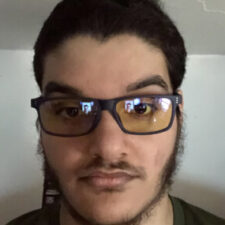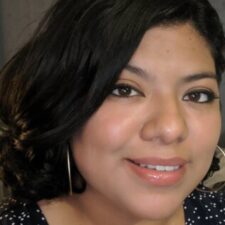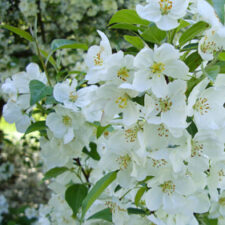The topic ‘’ is closed to new replies.
- Session 5, Participation Activity: Talking Back to Poetry
-
February 18, 2021 at 4:43 am #71083

Anthony LParticipantI listened to Stacey Ann Chin’s Poem “If only out of Vanity”, and I must say that it was something rather loud and vibrant to be hearing in the middle of the night. There’s nothing wrong with her articulating her poems in such a manner and I find stuff like that to be more appealing, especially when I can also feel the amount of passion she puts into her words. It’s almost as if you can feel her soul behind her words and she’s trying to make it burn as bright as she possibly can, to make others notice her, to make her words into something that no one could possibly ignore. Listening to her is just like listening to a war cry or some kind of motivational speech, like something that makes you believe in her cause, that what she’s trying to do is worth it. After all that, I went back and recorded 2 lines that really stuck out to me.
The first line I wrote down is “Will I still be raising revolutionary flags and making impassioned speeches that stir up anger in the hearts of psuedo-liberals dressed in navy blue conservative wear.” After watching the whole video to the end, looking at these quotes sparked a few questions in my mind. One of those questions being; do you believe your efforts won’t be recognized in the future? I ask this because it seem as if this this line radiates some form of doubt. That’s the vibe I get from it, will I still be doing this even when I’m old and frail or will I rest knowing that I’ve made an impact on the minds of the stubborn, breaking down their walls and opening up new possibilities for others to carry on my legacy. Another question I had was; what is your drive behind all of this. Now I understand that she said something towards the end of the video that somewhat answers this question, but it doesn’t exactly depict a clear understanding. Does she say these things in hopes that others may carry on her mission, or perhaps she says this to shake people up and make them think. Does she speak out for the sheer sake of revolution, to bring about the winds of change to slowly turn the wheels of fate towards a brighter and accepting future. I want to know what makes her wake up in the morning and say ‘ I’m gonna speak in front of a crowd and let my poetry, my art, shake them to their very core’. Ending on that note, my second quote is “Will I be more grateful for that, than for any forward movement in any current political course, and will it have been worth it then”. I also feel a bit of doubt in this line as well, and despite those questions I asked before, being relevant to this quote too. I had one final question for this line; Are you afraid that others might outshine you and your words will fail to impact those who listen to you, that your voice will fade into the obscurity of the past without leaving an impression? To be honest I mainly wanted to ask the types of questions that are deep and hard to answer completely. I’m unsure if the questions I asked are proper or valid, I simply wanted to know what fuels her passions. I have always been a very curious kid, so asking questions that make you question yourself has always been a big thing for me.
February 18, 2021 at 5:01 am #71084
Anthony LParticipantHello Lauriann. I wanted to agree with your statement of Stacey “display of raw and pure passion”. As a person who was watching that video in the middle of the night, I can say that the mere sound of her voice was enough to awaken me from my tired funk almost as if I drank a whole cup of coffee in one go. I became deeply invested in what I heard and I felt like I was drawn into what she was saying. Also reading how you felt certain lines “spoke” to you made me realize how different lines can be interpreted by applying your own personal experiences and feelings. I was only focused on what she thinks and feels instead of what I feel about what she says. It takes a different person’s perspective to reveal a whole different part of the whole picture and that’s a wonderful thing.
February 18, 2021 at 6:34 am #71085
Arianna BetancourtParticipantI have chosen Mohamed Hassan-(un)LEARNING MY NAME for this “talk back.” One of the first sentences had connected with me right away; “Mohamed, the first time I was mistaken as a white man I feel a rush if joy urge from my gut, a relief.” Mohamed had utter relief once people assumed he was white. It was easier to assume he was white rather than his own ethnicity. It was the convenience and loss to his own culture. Mohamed is almost torn between both his culture wanted others to hope he is white; so he does not have to explain himself.
Nor, justify the means if his name; until learning how to embrace his own self through his religion.
This video spoke to me in various aspects, I become at joy when someone mistakens my ethnicity. I am a mixed Guyanese and Puerto RIcan and whenever someone asks if I am Hispanic; I would try to say I’m Egyptian or other country. I did not enjoy the stigma I received for only looking Hispanic. It made me feel lost in my own identity being raised throughout my West Indian side. It had taken me years to be comfortable with my own ethnicity.
“It takes me nineteen years to learn how to pronounce my name in public and the first time I say it the way my mother did. She named me Mohamed, feels like I have stolen something back.”
I have stolen something back as well; apart of myself I had resented.February 18, 2021 at 12:15 pm #71096
Stephanie HernandezParticipant“Why are you here?” Ariana Brown. Dear white girls in my Spanish class.
This line, although short, really stood out to me the most than the other lines in her spoken word poem. This question is everything. It validates the writer, her feelings, her value, her culture. She questions the presence of the white girls in her Spanish class. She is questioning the actions(laughing) of the white girls in her Spanish class. The writers question is a valid one. It was interesting because being a Latina myself and having been in a Spanish class with white female peers, this isn’t a question that I ever remember thinking of at that point. It is interesting because the actions she describes of her white female peers bringing up this valid question, as well as some feelings coming from what her peers sees her self-worth being.
Although this question, and her reflection of self worth through others peoples eyes might of happen at this particular point for her, for me it wasn’t until I was older and working in a predominantly white workplace. I myself have wondered what my peers thought of my self worth because of certain things they might of said unintentionally. This poem made me realize and reflect just how far I have come and grown. That as a child and teenager being born and raised also in a predominantly white neighborhood and school I use to question my self- worth, but thankfully because of my wonderful step-father who raised me and knew of these struggles of questioning ones self-worth being a black man growing up. He taught me to never question my self-worth. He taught me to love myself and my culture, so now as and adult I no longer question my self- worth, but from time to time I do question what my peers think of my self-worth.February 18, 2021 at 1:04 pm #71097
jenni727ParticipantStaceyann Chin’s Spoken Word presentation on Def Poetry, “If Only Out of Vanity,”
“If only out of vanity, I wonder what kind of woman I will be when I am well-passed the summer of my raging youth… Will I still be raising revolutionary flags and making impassioned speeches that stir up anger in the hearts of pseudo-liberals dressed in navy blue conservative wear?”My questions:
Did you ever fear that age would make it so that people would take your passion for speaking out less seriously?
In your poetry, it seems that you associate being older of age with debility and lack of independence- why?
When you get on stage, you become a physical demonstration of your art. You become the passion behind your words. Was this natural for you? Or did you incorporate physical gestures to really drive your points home?
Do you believe if you were to die the next day that your previous actions on this earth would leave a lasting impact?I chose this poem because of it’s focus on the concept of age. It’s interesting how advanced age is viewed as something that will tragically slow us down; that once we get to a certain set of digits, once our hair starts to turn grey, that we will no longer be passionate fighters. You ask if once you’re passed your youth if you’ll still protest for what you believe in, and I ask you in return- why would you ever stop? The passion that is manifested through your words and your movements wouldn’t be lost due liver spots and a wrinkled forehead. Passion, I believe, transcends age and time. If anything, seeing the government’s violations of minorities year after year would ignite greater desire to raise your flags and make speeches; to be the voice of the unheard and underrepresented.
Why is it that a woman’s value seemingly diminishes over time? Why are we afraid to reach a point in our lives that many do not have the privilege to reach? Age brings wisdom and courage, and if you’re still able to shout at eighty-nine then who says you should ever stop fighting? Maybe the younger protestors will be fresh college-grads with slim waists and pretty faces, but why would that have to cheapen your battle for positive political change? Sometimes I too wonder what my life will be like when I’m older, if I’ll have much to reflect on or if I’ll sit in despair because I spent too much time in my youth worrying and overthinking. Then again, who says I won’t be able to enjoy and make the most out of every second of elderhood? Why can’t you? Doesn’t the vivacious soul outlive the deteriorating flesh?February 18, 2021 at 1:11 pm #71098
jenni727ParticipantHello Stephanie,
I too am Hispanic, and I remember going to a high school that was predominantly white and feeling as if I stuck out like a sore thumb. That kind of situation can be uncomfortable and put someone in a place of guessing his/her self-worth. Though, I’m so glad you had a positive figure in your life, your step-father, because he helped you see your worth. Different does not equate less valuable.
February 18, 2021 at 1:32 pm #71099
Darrench3nParticipantI will “talk back” to Mohamed Hassan-(un)LEARNING MY NAME because it stood out to me the most. I never experience nor felt that just someone’s name could cause a what I saw as a identity crisis.
The line that affect me the most was “It takes me nineteen years to learn how to pronounce my own name in public” because this just tell me that it was society that pressure him into calling himself “Mohamed”.
Another line was ” I still say it the way my first white teacher said it. The way she corrected me in front of the classroom until I stumble over my identity the way she did” this left a mark on my into have the way we say things could effect other people and their own point of view.
February 18, 2021 at 1:37 pm #71100
Asalah AlhababiParticipantHello Stephanie, I agree with that we all faced some same racism as Ms. Ariana and the special things is how these things changed us and make us stronger than before. I liked when talked about self- worth and how it’s all what matter to you. For me, on the past I faced a lot of discrimination and I was becoming upset and heartbroken easily. Nevertheless, when I comprehended that this will keep happening to me, I realized that I must stop being attention to these things and let it go because my health and happiness is the most crucial thing to me.
February 18, 2021 at 1:37 pm #71101
Asalah AlhababiParticipantI liked all the videos, but the most video that grabbed my attention is the one by Ariana Brown “Dear White Girls in my Spanish Class”. The tone of her poem was convincing and made feel her words that full of passion.
The two quotes that interested me are when she stated that, “So afraid, she buried her first language in the space between blood and bone because your grandparents wouldn’t let her make a home outside her body”. And the second quote was, “How does it feel to take a foreign language for fun? To owe you history nothing?”
“Talk Back”, the first quote is emotionally since it reveals how she hides her own language just because of the society who will not be attention to it or treated with it. That what scared her makes her native language to become unknown. I can relate this quote to me in order that my first language is Arabic and I know how does it feel when you came to a new country trying to learn their language and culture. However, the worst thing is when you find someone who tried to smash you rather than support you and didn’t want you to become success not because they know that you will not reach it but because they are terrified from you that one day you will become better than them.
The second quote demonstrated how she wondered how does it feel when you learn a language without purpose and your history is destroying you will feel guilty to your past. From my perspective I can see how I didn’t speak Arabic at the public, but I still can speak it at home with my family. Also, I try to teach my little brother by reading books and speaking with him in Arabic, for this language is my identity and it should be passed from one generation to another. Therefore, this will make us understand that your language, ethnicity, and culture are all what you have and you have to protect it. My only one question to Ms. Brown is that if you didn’t speak Spanish and English what is your native language?February 18, 2021 at 2:08 pm #71102
sagarParticipantI liked all the videos but one video that touched my feeling is “Dear White Girls in My Spanish Class”, written by Ariana Brown. Others videos topic were nice but quite hard for me to explain in easy sentences. But when i started to listen Ariana Browns words, they stuck into my brain and i started to visualize her words and her pain. This took me back to my history class where i studied about war during colonial time. I quoted 3 sentences from this video poem,”Spanish was given to my people at the end of sword. Spanish is not my native tongue. English is not my native tongue.”
This poem is a clear visualization of pain, anger and sorrow that poet feel for her and her ancestor where they are being treated as another class in their own place. The poet wants to know who is she and what is her reality but her history, culture, language had been erased during colonial time. She feels bad when her tones or ascent is a subject of fun around other people. She is telling her pain that what she has now as her language its not hers, it was given by force and threat. She wants her friends to understand her pain and she wants her own freedom and her own way of speaking.
-
This reply was modified 3 years, 5 months ago by
 sagar.
sagar.
February 18, 2021 at 2:25 pm #71104
sagarParticipantAsalah i have same thing to say as you have written. I used to feel the same way but later i realized that i shouldnt care what other says just love what you are and who you are?.
February 18, 2021 at 2:57 pm #71105
Michael VanunuParticipantI chose the poem “(un)Learning my name, by Mohamed Hassan”. My questions for Mohamed would be, what circumstances gave rise to the poem? Who or what is the audience? The poem is more deeper than I can think so these would be interesting questions I would like the answer to.
The part of the poem that struck me the most was the ending, “Mohamed, Mohamed, Mohamed, Mohamed, takes me nineteen years to learn how to pronounce my own name in public. The first time I say it the way my mother did when she named me, Mohamed, it feels like I have stolen something back.”. These two sentences in the song struck me more than the other lines, it was the perfect way to end the poem. During the beginning of the poem, he says his name, Mohamed, four times and then almost right before it ends, he says it again four more times, except this time the fourth time he says his name is when he pronounced it just like his mother did when he was born, as he says. When Mohamed said that it felt like he has stolen something back it sounded to me like he was sad and happy at the same time.
-
This reply was modified 3 years, 5 months ago by
 Michael Vanunu.
Michael Vanunu.
February 18, 2021 at 3:14 pm #71107
DavidParticipantThe spoken work poem that I chose to write about was the one written by Ariana Brown. It is called “Dear White Girls In My Spanish Class”, Overall I really enjoyed her poem. By listening to her read her poem aloud I can see that she relates to what she says a lot. The things that she talks about are most likely things that have happened to her in real life because while she speaks it sounds like shes about to break down in tears.
One line that I found that really spoke to me was “Dear white girls in my spanish class: I see you, stumbling so hard you laugh through entire sentences because my ancestors are a punchline, and everything that comes out of your mouth is funny”. Who is the speaker? The speaker is Ariana Brown, a person of color from Texas. What is the tone? To me the is serious and subtle. The speaker is talking about her personal experience as a spanish speaking individual in a spanish class where the non spanish speaking students joke around. Does the poem speak from a specific culture? After hearing the poem I can see that she is talking about american culture in which spanish speaking individuals aren’t taking seriously.February 18, 2021 at 3:19 pm #71108
DavidParticipantHello Michael, I agree with what you said about Mohamed being happy and sad because of how he pronounced his name.
February 18, 2021 at 3:30 pm #71109
Vramirez112Participant“(un)Learning My Name” by Mohamed Hasan
“The first time I am mistaken for a white man I feel a rush of joy lurching from my gut, a relief. I finally won a place today. A right to belong. An invisibility of only for a moment”
The speaker in this poem is Mohamed Hasan and he is talking about how his name has shaped and affected his life. The tone of the poem starts off as almost fearful, painful, or even uneasy. You can tell based on the way the poem is spoken, the way his words are organized that this is not an easy subject for the speaker to discuss or admit. These few lines that I selected stood out to me at first because of what they mean not to me but in society. The speaker says that he feels a form of relief, of happiness when he is mistaken for a race he does not belong to. It is almost like he feels ashamed to claim the race he belongs to simply because of how others feel and react towards it. He feels that when people do not identify him correctly that he finally belongs and has a place in society. He does not choose to hide his race and is not ashamed of it in any way but feels relief when he does not have to confront others about it.
The title of the poem is also very important because it is directly connected to the meaning behind the poem. The speaker discusses breaking free from the restraints placed on him on how to pronounce his name, how he presents himself, and how he is to express himself. His name has been mispronounced his entire life and he has even been “corrected” on how to pronounce his name by other people. He was taught to pronounce and use his name the way all others did. He has to unlearn the name others gave him so that he could learn and understand his true name given to him at birth and to embrace it rather than cover it up and hide it’s true value. -
This reply was modified 3 years, 5 months ago by
The topic ‘’ is closed to new replies.


